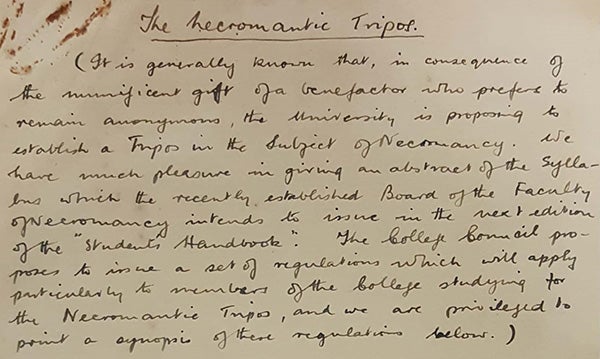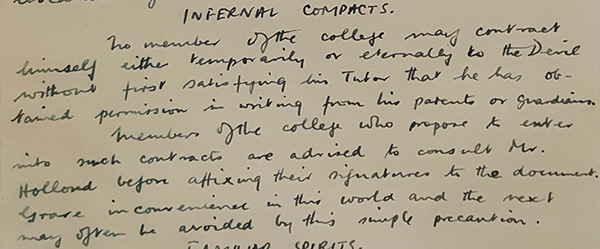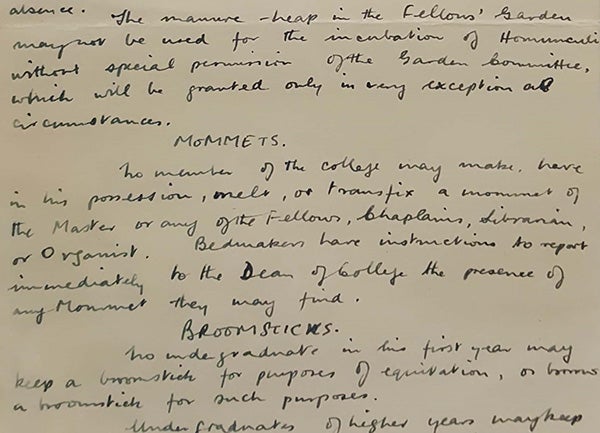During the processing of the Montague Summers papers, recently opened to researchers at the Booth Family Center for Special Collections, I came across an unusual manuscript in unidentified handwriting titled “The Necromantic Tripos,” written on seven sheets of letter-paper signed “C.D. Broad, in the Trinity Magazine, Dec. 1926.” Because the occult was a particular field of interest for Montague Summers, I immediately noticed the word "necromantic," and decided to take a closer look; for starters, what is a necromantic tripos? For that matter, what is a tripos? And who is C.D. Broad?

These questions, as it turns out, are easily answered. “Tripos” is a word only commonly used in English in regards to the undergraduate curriculum at Cambridge University, referring to the tripod or stool on which candidates were historically examined for their degree. Today, tripos still refers to a specific course of study at Cambridge, such as the Geographical Tripos or the Linguistics Tripos, including the examinations required to attain a bachelor’s degree. This reveals a connection to our manuscript by C.D. Broad. Charlie Dunbar Broad (1887-1971) successfully completed his tripos in 1906, became a lecturer at Cambridge in 1923, and in the year our manuscript was published in the university’s Trinity Magazine he became a lecturer in the faculty of philosophy at Cambridge. In the course of his career, Broad authored several works on epistemology and the philosophy of science; later in his career Broad took an interest in the philosophical aspects of psychical research.
So what is a “necromantic tripos”? Historically, necromancy referred specifically to the summoning of, and communication with, spirits of the dead or spirits more generally; over time the term came to be generally applied to any practices associated with sorcery or “black magic.” C.D. Broad’s article for the Trinity Magazine meticulously sets out a full curriculum for the study of magic, high and low, theoretical and practical. According to Broad, the university’s plans to “establish a Tripos on the Subject of Necromancy” were the result of “the munificent gift of a benefactor who prefers to remain anonymous”; he then sets out a course of study in 2 parts, the first being a series of papers on the subjects of astrology, alchemy, the elements of magic, etc., and the second being "sections" of courses on the theory and practice of a multitude of topics, including divination, magical potions, curses, and supernatural locomotion—including the aerodynamics of the broomstick.


Certain rules are mentioned with some specificity. For example, while permission is necessary for a student to keep a familiar spirit in his room, if it is in the form of a cat or tortoise, permission is generally given, while a Spectral Hound kept as familiar would be barred under the general rule against dogs. ‘Homunculi’ are likewise permitted in the students’ rooms, but only in “stout and properly stoppered bottles”. In some instances, Broad’s injunctions appear more credible than the rules imagined at Hogwart’s, as we find that “No undergraduate in his first year may keep a broomstick for purposes of equitation, or borrow a broomstick for such purposes.” In a similarly reasonable vein, Broad states that “Hands of Glory count as oil-lamps, not as candles, and their use as illuminants in college rooms is absolutely forbidden.” Thus ends the Necromantic Tripos.

Why did C.D. Broad write this? Was it for entertainment only, or was there another context for such an article? Can the handwriting of the manuscript be identified, and is it Broad’s? Can the original, published article be found? These questions, so far, are not so easily answered.

--Ted Jackson, Manuscripts Archivist
February 28, 2018
